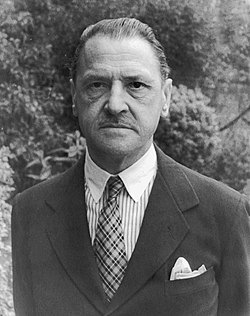W. Somerset Maugham Quote
It amused him sometimes to consider that his friends, because he had a face which did not express his feelings very vividly and a rather slow way of moving, looked upon him as strong-minded, deliberate and cool. They thought him reasonable and praised his common sense; but he knew that his placid expression was no more than a mask, assumed unconsciously, which acted like the protective colouring of butterflies; and himself was astonished at the weakness of his will. It seemed to him that he was swayed by every light emotion, as though he were a leaf in the wind, and when passion seized him he was powerless. He had no self-control. He merely seemed to possess it because he was indifferent to many of the things which moved other people.He considered with some irony the philosophy which he had developed for himself, for it had not been of much use to him in the conjuncture he had passed through; and he wondered whether thought really helped a man in any of the critical affairs of life: it seemed to him rather that he was swayed by some power alien to and yet within himself, which urged him like that great wind of Hell which drove Paolo and Francesca ceaselessly on. He thought of what he was going to do and, when the time came to act, he was powerless in the grasp of instincts, emotions, he knew not what. He acted as though he were a machine driven by the two forces of his environment and personality; his reason was someone looking on, observing the facts but powerless to interfere: it was like those gods of Epicurus, who saw the doings of men from their empyrean heights and had no might to alter one smallest particle of what occurred.
It amused him sometimes to consider that his friends, because he had a face which did not express his feelings very vividly and a rather slow way of moving, looked upon him as strong-minded, deliberate and cool. They thought him reasonable and praised his common sense; but he knew that his placid expression was no more than a mask, assumed unconsciously, which acted like the protective colouring of butterflies; and himself was astonished at the weakness of his will. It seemed to him that he was swayed by every light emotion, as though he were a leaf in the wind, and when passion seized him he was powerless. He had no self-control. He merely seemed to possess it because he was indifferent to many of the things which moved other people.He considered with some irony the philosophy which he had developed for himself, for it had not been of much use to him in the conjuncture he had passed through; and he wondered whether thought really helped a man in any of the critical affairs of life: it seemed to him rather that he was swayed by some power alien to and yet within himself, which urged him like that great wind of Hell which drove Paolo and Francesca ceaselessly on. He thought of what he was going to do and, when the time came to act, he was powerless in the grasp of instincts, emotions, he knew not what. He acted as though he were a machine driven by the two forces of his environment and personality; his reason was someone looking on, observing the facts but powerless to interfere: it was like those gods of Epicurus, who saw the doings of men from their empyrean heights and had no might to alter one smallest particle of what occurred.
Related Quotes
About W. Somerset Maugham
Maugham's novels after Liza of Lambeth include Of Human Bondage (1915), The Moon and Sixpence (1919), The Painted Veil (1925), Cakes and Ale (1930) and The Razor's Edge (1944). His short stories were published in collections such as The Casuarina Tree (1926) and The Mixture as Before (1940); many of them have been adapted for radio, cinema and television. His great popularity and prodigious sales provoked adverse reactions from highbrow critics, many of whom sought to belittle him as merely competent. More recent assessments generally rank Of Human Bondage – a book with a large autobiographical element – as a masterpiece, and his short stories are widely held in high critical regard. Maugham's plain prose style became known for its lucidity, but his reliance on clichés attracted adverse critical comment.
During the First World War Maugham worked for the British Secret Service, later drawing on his experiences for stories published in the 1920s. Although primarily homosexual, he attempted to conform to some extent with the norms of his day. After a three-year affair with Syrie Wellcome which produced their daughter, Liza, they married in 1917. The marriage lasted for twelve years, but before, during and after it, Maugham's principal partner was a younger man, Gerald Haxton. Together they made extended visits to Asia, the South Seas and other destinations; Maugham gathered material for his fiction wherever they went. They lived together in the French Riviera, where Maugham entertained lavishly. After Haxton's death in 1944, Alan Searle became Maugham's secretary-companion for the rest of the author's life. Maugham gave up writing novels shortly after the Second World War, and his last years were marred by senility. He died at the age of 91.
